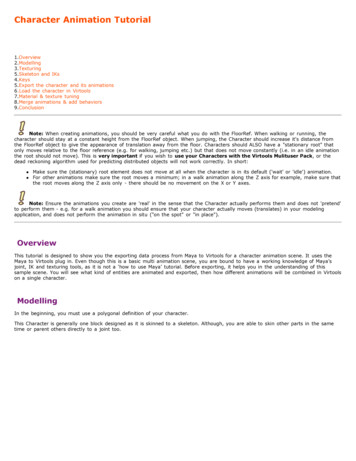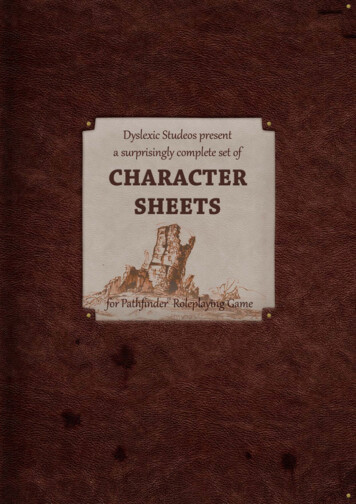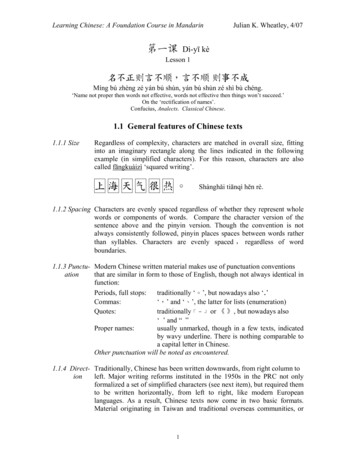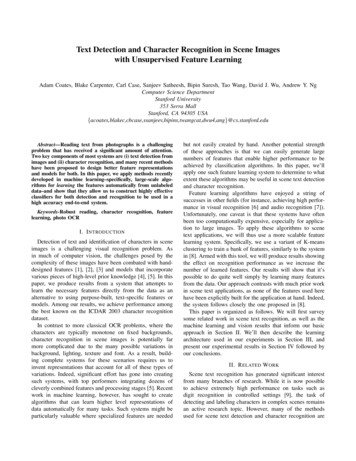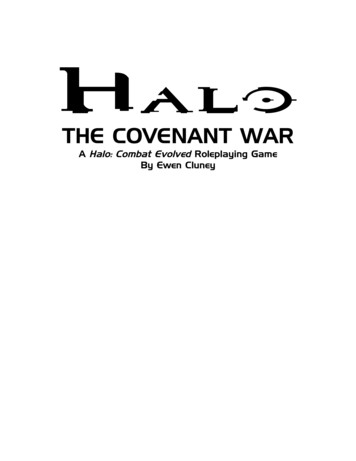
Transcription
AnswersTeacher CopyACTIVITY 1.4: Language and Writer’s Craft: SyntaxACTIVITY 1.5“Two Kinds” of Cultural IdentityLearning TargetAnalyze how two characters interact and develop over the course of a text to explain how conflict is used to advance the theme.Discussion Groups (Learning Strategy)DefinitionEngaging in an interactive, small-group discussion, often with an assigned role; to consider a topic, text, or questionPurposeTo gain new understanding of or insight into a text from multiple perspectivesMarking the Text (Learning Strategy)DefinitionSelecting text by highlighting, underlining, and/or annotating for specific components, such as main idea, imagery, literary devices, and so onPurposeTo focus reading for specific purposes, such as author’s craft, and to organize information from selections; to facilitate reexamination of a textBrainstorming (Learning Strategy)DefinitionUsing a flexible but deliberate process of listing multiple ideas in a short period of time without excluding any idea from the preliminary listPurposeTo generate ideas, concepts, or key words that provide a focus and/or establish organization as part of the prewriting or revision processGraphic Organizer (Learning Strategy)DefinitionUsing a visual representation for the organization of information from the textPurposeTo facilitate increased comprehension and discussionQuestioning the Text (Learning Strategy)DefinitionDeveloping levels of questions about text; that is, literal, interpretive, and universal questions that prompt deeper thinking about a textPurposeTo engage more actively and independently with texts, read with greater purpose and focus, and ultimately answer questions to gain greaterinsight into the text; helps students to comprehend and interpretLearning StrategiesDiscussion Groups, Marking the Text, Brainstorming, graphic organizer, Questioning the TextPreviewLiterary TermsA conflict is a struggle or problem in a story. The central conflict of a fictional text sets the story in motion. An internal conflict occurs whena character struggles between opposing needs or desires or emotions within his or her own mind. An external conflict occurs when ap. 21
character struggles against an outside force. This force may be another character, a societal expectation, or something in the physical world.In this activity, you will read an excerpt from a novel and analyze the conflict between two characters.Setting a Purpose for ReadingAs you read Amy Tan’s “Two Kinds,” look for evidence of conflict. Mark the text for the reasons for the conflict and how it is resolved.Circle unknown words and phrases. Try to determine the meaning of the words by using context clues, word parts, or a dictionary.p. 30p. 29p. 28p. 27p. 26p. 25p. 24p. 23p. 22Novel ExcerptAbout the AuthorAmy Tan was born in California in 1952, several years after her parents left their native China. A writer from a very young age, Tan experienceddifficulty early in life resulting from the untimely deaths of her father and brother, a rebellious adolescence, and the expectations of others.Educated at a Switzerland boarding school as well as at San Jose State and Berkeley, Tan ultimately became a writer of fiction. She has writtennumerous award-winning novels, including her most famous The Joy Luck Club, from which “Two Kinds” is an excerpt. Tan resides in SanFrancisco with her husband and two dogs, Bubba and Lilli.Two Kindsby Amy Tan00:00 / 28:58Chunk 11My mother believed you could be anything you wanted to be in America. You could open a restaurant. You could work for the government andget good retirement. You could buy a house with almost no money down. You could become rich. You could become instantly famous.2“Of course, you can be a prodigy, too,” my mother told me when I was nine. “You can be best anything. What does Auntie Lindo know? Herdaughter, she is only best tricky.”3 America was where all my mother’s hopes lay. She had come to San Francisco in 1949 after losing everything in China: her mother and father,her home, her first husband, and two daughters, twin baby girls. But she never looked back with regret. Things could get better in so many ways.4We didn’t immediately pick the right kind of prodigy. At first my mother thought I could be a Chinese Shirley Temple. We’d watch Shirley’sold movies on TV as though they were training films. My mother would poke my arm and say, “Ni kan. You watch.” And I would see Shirleytapping her feet, or singing a sailor song, or pursing her lips into a very round O while saying “Oh, my goodness.” “Ni kan,” my mother said, asShirley’s eyes flooded with tears. “You already know how. Don’t need talent for crying!”5Soon after my mother got this idea about Shirley Temple, she took me to the beauty training school in the Mission District and put me in thehands of a student who could barely hold the scissors without shaking. Instead of getting big fat curls, I emerged with an uneven mass of crinklyblack fuzz. My mother dragged me off to the bathroom and tried to wet down my hair.6“You look like a Negro Chinese,” she lamented, as if I had done this on purpose.7The instructor of the beauty training school had to lop off these soggy clumps to make my hair even again. “Peter Pan is very popular thesedays” the instructor assured my mother. I now had bad hair the length of a boy’s, with curly bangs that hung at a slant two inches above myeyebrows. I liked the haircut, and it made me actually look forward to my future fame.indignity: something that happens that causes insult or embarrassmentreproach: criticism8In fact, in the beginning I was just as excited as my mother, maybe even more so. I pictured this prodigy part of me as many different images,and I tried each one on for size. I was a dainty ballerina girl standing by the curtain, waiting to hear the music that would send me floating on mytiptoes. I was like the Christ child lifted out of the straw manger, crying with holy indignity. I was Cinderella stepping from her pumpkin carriagewith sparkly cartoon music filling the air.9In all of my imaginings I was filled with a sense that I would soon become perfect: My mother and father would adore me. I would be beyondreproach. I would never feel the need to sulk, or to clamor for anything. But sometimes the prodigy in me became impatient. “If you don’t hurryup and get me out of here, I’m disappearing for good,” it warned. “And then you’ll always be nothing.”Chunk 210Every night after dinner my mother and I would sit at the Formica topped kitchen table. She would present new tests, taking her examplesfrom stories of amazing children that she read in Ripley’s Believe It or Not or Good Housekeeping, Reader’s Digest, or any of a dozen other
magazines she kept in a pile in our bathroom. My mother got these magazines from people whose houses she cleaned. And since she cleanedmany houses each week, we had a great assortment. She would look through them all, searching for stories about remarkable children.11The first night she brought out a story about a three-year-old boy who knew the capitals of all the states and even most of the Europeancountries. A teacher was quoted as saying that the little boy could also pronounce the names of the foreign cities correctly. “What’s the capital ofFinland?” my mother asked me, looking at the story.12All I knew was the capital of California, because Sacramento was the name of the street we lived on in Chinatown. “Nairobi!” I guessed,saying the most foreign word I could think of. She checked to see if that might be one way to pronounce Helsinki before showing me the answer.13The tests got harder—multiplying numbers in my head, finding the queen of hearts in a deck of cards, trying to stand on my head withoutusing my hands, predicting the daily temperatures in Los Angeles, New York, and London. One night I had to look at a page from the Bible forthree minutes and then report everything I could remember. “Now Jehoshaphat had riches and honor in abundance and that’s all I remember,Ma,” I said.listlessly: without energy or enthusiasmbellows: deep, low soundsGrammar & Usage: SyntaxEffective syntax enhances the meaning and contributes to the tone of a piece of writing.Notice the arrangement of words in the sentences beginning with “She got up .” through the rest of the first paragraph in Chunk 3. Theshort, abrupt sentences affect the reader’s perception of the mother. She appears comical, almost like a mechanical toy.Now look back at the underlined sentence in Chunk 2. What feeling or attitude does this syntax convey? Look for other longer, moarecomplex sentences in the story. Describe how the syntax helps the author express more complicated ideas and feelings.14And after seeing, once again, my mother’s disappointed face, something inside me began to die. I hated the tests, the raised hopes and failedexpectations. Before going to bed that night I looked in the mirror above the bathroom sink, and I saw only my face staring back—andunderstood that it would always be this ordinary face—I began to cry. Such a sad, ugly girl! I made high-pitched noises like a crazed animal,trying to scratch out the face in the mirror.15And then I saw what seemed to be the prodigy side of me—a face I had never seen before. I looked at my reflection, blinking so that I couldsee more clearly. The girl staring back at me was angry, powerful. She and I were the same. I had new thoughts, willful thoughts—or, rather,thoughts filled with lots of won’ts. I won’t let her change me, I promised myself. I won’t be what I’m not.16So now when my mother presented her tests, I performed listlessly, my head propped on one arm. I pretended to be bored. And I was. I got sobored that I started counting the bellows of the foghorns out on the bay while my mother drilled me in other areas. The sound was comfortingand reminded me of the cow jumping over the moon. And the next day I played a game with myself, seeing if my mother would give up on mebefore eight bellows. After a while I usually counted only one bellow, maybe two at most. At last she was beginning to give up hope.Chunk 317Two or three months went by without any mention of my being a prodigy. And then one day my mother was watching the Ed Sullivan Show onTV. The TV was old and the sound kept shorting out. Every time my mother got halfway up from the sofa to adjust the set, the sound wouldcome back on and Sullivan would be talking. As soon as she sat down, Sullivan would go silent again. She got up—the TV broke into loud pianomusic. She sat down—silence. Up and down, back and forth, quiet and loud. It was like a stiff, embraceless dance between her and the TV set.Finally, she stood by the set with her hand on the sound dial.mesmerizing: spellbinding18She seemed entranced by the music, a frenzied little piano piece with a mesmerizing quality, which alternated between quick, playful passagesand teasing, lilting ones.19“Ni kan,” my mother said, calling me over with hurried hand gestures. “Look here.”20I could see why my mother was fascinated by the music. It was being pounded out by a little Chinese girl, about nine years old, with a PeterPan haircut. The girl had the sauciness of a Shirley Temple. She was proudly modest, like a proper Chinese Child. And she also did a fancysweep of a curtsy, so that the fluffy skirt of her white dress cascaded to the floor like petals of a large carnation.
21In spite of these warning signs, I wasn’t worried. Our family had no piano and we couldn’t afford to buy one, let alone reams of sheet musicand piano lessons. So I could be generous in my comments when my mother badmouthed the little girl on TV.22“Play note right, but doesn’t sound good!” my mother complained. “No singing sound.”23“What are you picking on her for?” I said carelessly. “She’s pretty good. Maybe she’s not the best, but she’s trying hard.” I knew almostimmediately that I would be sorry I had said that.
24“Just like you,” she said. “Not the best. Because you not trying.” She gave a little huff as she let go of the sound dial and sat down on the sofa.25The little Chinese girl sat down also, to play an encore of “Anitra’s Tanz,” by Grieg. I remember the song, because later on I had to learn howto play it.26Three days after watching the Ed Sullivan Show my mother told me what my schedule would be for piano lessons and piano practice. She hadtalked to Mr. Chong, who lived on the first floor of our apartment building. Mr. Chong was a retired piano teacher, and my mother had tradedhousecleaning services for weekly lessons and a piano for me to practice on every day, two hours a day, from four until six.27When my mother told me this, I felt as though I had been sent to hell. I whined, and then kicked my foot a little when I couldn’t stand itanymore.28“Why don’t you like me the way I am?” I cried. “I’m not a genius! I can’t play the piano. And even if I could, I wouldn’t go on TV if you paidme a million dollars!”29My mother slapped me. “Who ask you to be genius?” she shouted. “Only ask you be your best. For you sake. You think I want you to begenius? Hnnh! What for! Who ask you!”30“So ungrateful,” I heard her mutter in Chinese, “If she had as much talent as she has temper, she’d be famous now.”Chunk 431Mr. Chong, whom I secretly nicknamed Old Chong, was very strange, always tapping his fingers to the silent music of an invisible orchestra.He looked ancient in my eyes. He had lost most of the hair on the top of his head, and he wore thick glasses and had eyes that always lookedtired. But he must have been younger than I thought, since he lived with his mother and was not yet married.32I met Old Lady Chong once, and that was enough. She had a peculiar smell, like a baby that had done something in its pants, and her fingersfelt like a dead person’s, like an old peach I once found in the back of the refrigerator: its skin just slid off the flesh when I picked it up.33 I soon found out why Old Chong had retired from teachi
We’d watch Shirley’s old movies on TV as though they were training films. My mother would poke my arm and say, “ Ni kan . You watch.” And I would see Shirley tapping her feet, or singing a sailor song, or pursing her lips into a very round O while saying “Oh, my goodness.” “ Ni kan ,” my mother said, as Shirley’s eyes flooded with tears. “You already know how. Don’t need talent for crying!”



